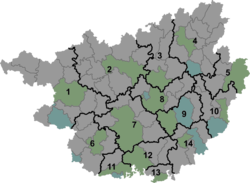Kitten Mountain (also Mao'er Mountains; Chinese: 猫儿山; pinyin: Māo'ér Shān) is a 2,142 metres (7,028 ft) mountain located on the border between Ziyuan County and Xing'an County, Guangxi Zhuang Autonomous Region (GZAR) in the People's Republic of China that lies about 80 kilometres (50 mi) from the prefecture-level city of Guilin.[1]
| Kitten Mountain | |
|---|---|
| Mao'er Mountains | |
| Highest point | |
| Elevation | 2,142 m (7,028 ft) |
| Prominence | 1,861.5 metres (6,107 ft) |
| Listing | Ultra |
| Coordinates | 25°48′N 110°20′E / 25.800°N 110.333°E |
| Geography | |
| Location | Xing'an County, Guangxi |
| Parent range | Yuecheng Mountains, Nan Range |
Description
editThe peak lies in the Yuecheng Mountains, part of the Nan Mountains and dates to the Neoproterozoic Era from 1,000 to 539 million years ago.[2] Kitten Mountain is the highest peak in Guangxi, with a prominence of 1,861.5 metres (6,107 ft) above the surrounding area, and it is a National Level Nature Reserve.[3]
World War II plane crash
editOn August 31, 1944, a Consolidated B-24 Liberator aircraft of the United States Army Air Corps crashed on Kitten Mountain following a bombing raid on Japanese warships off the coast of Taiwan. The ten man crew were listed as missing in action for 52 years until the remains of the aircraft were discovered in 1996 by two local youths searching for medicinal herbs.[4]
References
edit- ^ "猫儿山 (Kitten Mountain)" (in Chinese). guilin.net. Archived from the original on March 24, 2013. Retrieved March 30, 2013.
- ^ "An Analysis on Property and Dynamics of the Middle Neoproterozoic Sedimentary Basin in the West of South China". Retrieved March 30, 2013.
- ^ "猫儿山自然保护区景观、景点介绍 (Introduction to the landscape and attractions of Mao'ershan Nature Reserve)" (in Chinese). Retrieved March 23, 2022.
- ^ "WW II Airmen's Remains Come Home". ABC News Online. August 6, 2006. Retrieved March 30, 2013.
External links
edit- Mao'er Mountains (in Chinese): at the site of the Guangxi Guilin Mao'er Mountain National Nature Reserve Management Office; the link features a picture of the mountain and the local legend of how it came to be.
